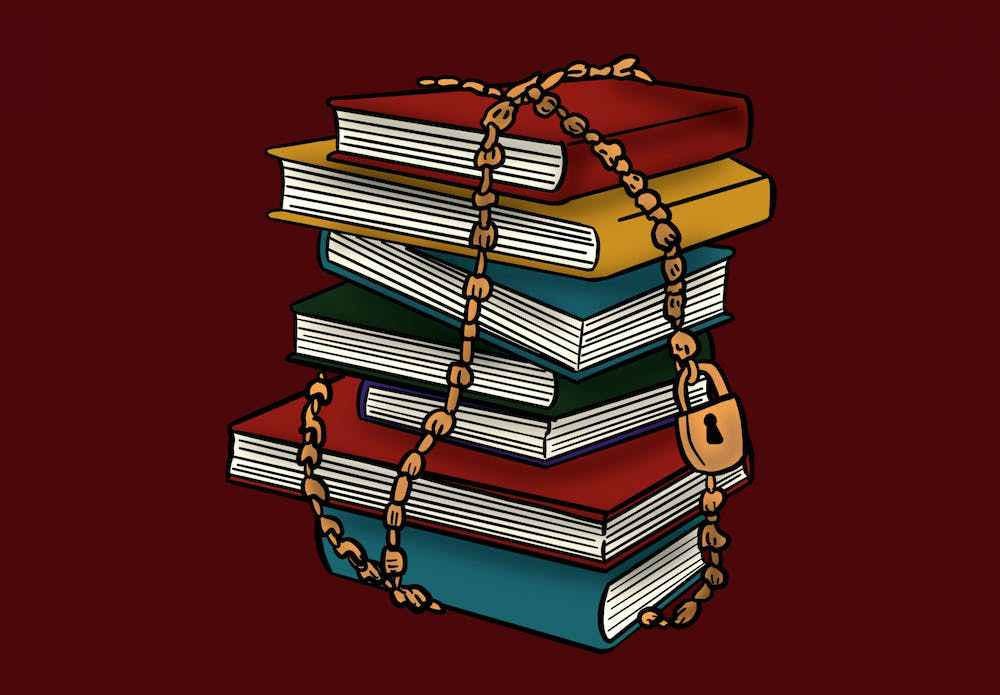Campus community members are concerned that nationwide book bans targeting LGBTQ+ authors, identities and themes are limiting self-expression and the exploration of LGBTQ+ identities.
In the 2022-23 school year, there were 3,362 book bans in American public high schools, according to a report by free speech advocacy group PEN America released last week. The number marks a 33% increase from the prior school year. Many of the banned titles featured LGBTQ+ authors and themes, according to the report.
The Herald spoke to University community members about how the bans impact readers in Providence and beyond.
“Banning books is an attempt to control what kids can imagine as possible for themselves and for their worlds,” said Leo Lovemore, Brown’s librarian for history, society and culture. Books are “an important point of access for folks to learn about the worlds that we never thought were possible,” they said.
Removing opportunities for people to see themselves in literature “sends a clear message that not all forms of expression are acceptable,” Lovemore added.
The report found that Texas and Florida had the greatest number of book bans, but Rhode Island isn’t without disputes over what is appropriate to discuss in schools.
In an online statement, the Rhode Island Library Association noted that “a few individuals and organizations (advanced) the proposition that voices of the marginalized have no place on library shelves.”
Censorship against materials about LGBTQ+ history and issues, among other identity-related topics, “pose a real and present threat to libraries’ ability to fulfill their role as trusted community institutions that provide factual and accurate information that reflects the breadth of the American experience,” the statement reads.
Kylie Brewer ’24, president of Queer Alliance, said she was struck by attempts to shield kids from discussions relating to LGBTQ+ identities in school.
As a sex education teacher, Brewer said she has seen families pull their students out of class to prevent them from being “exposed to queer education,” and has witnessed the bullying of LGBTQ+ students as well.
“Banning queer literature and sex education is only going to make incidents like that more frequent and really harm young queer individuals,” she said. “Education and books help people become more empathetic and understanding of other people.”
Young students aren’t the only individuals impacted by book bans. Sometimes, bans make it challenging for librarians to serve library patrons, according to Felicia Salinas-Moniz, director of the Sarah Doyle Center for Women and Gender.
“The impact of book bans is far-reaching,” Salinas-Moniz said. “Not only do they impact readers and authors, especially those from marginalized identities, but book bans also make it difficult for libraries and librarians to do their work of making books accessible.”
Lovemore, who is working to develop the John D. Rockefeller Jr. Library’s collections on gender and sexuality, is trying to tackle this problem by making the collections accessible to institutions outside of Brown.
The Rock’s inventory, which contains books that are banned in many libraries, can eventually be made accessible to others through interlibrary loans, they explained.
Lovemore hopes to play “a role in leveraging Brown’s resources towards building and making accessible these collections that might actually be targeted elsewhere,” they said.
As the year goes on, they also hope to listen to students when choosing which texts should be included in the collection. “I see this collection building as a joint process,” Lovemore said. “A collaborative process that I hope produces a more interesting and diverse collection for our community and beyond.”

Cate Latimer is a university news editor covering faculty, University Hall and higher education. She is from Portland, OR, and studies English and Urban Studies. In her free time, you can find her playing ultimate frisbee or rewatching episodes of Parks and Rec.





